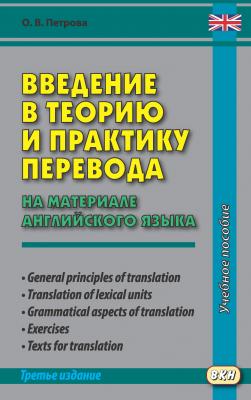Введение в теорию и практику перевода (на материале английского языка). Ольга Петрова
Читать онлайн.| Название | Введение в теорию и практику перевода (на материале английского языка) |
|---|---|
| Автор произведения | Ольга Петрова |
| Жанр | Учебная литература |
| Серия | |
| Издательство | Учебная литература |
| Год выпуска | 2016 |
| isbn | 978-5-7873-1096-2 |
These are the main ways of translating figurative phraseological units.
When translating phraseological units it is necessary to remember that some of them have a definite national character, which makes their translation rather difficult. On the one hand, it is not always easy to preserve the national "flavour" in translation, on the other – there is always a danger of introducing national elements of TL. Semantically "to carry coals to Newcastle" and "ездить в Тулу со своим самоваром" are analogues, nevertheless one can hardly insert Тула in a text translated from English. In such cases it is advisable to find (or coin, if necessary) a neutral expression with the same figurative meaning: "носить уголь в шахту (воду в реку, дрова в лес и т.д.)". There should be no "коломенская верста" or "Тришкин кафтан" or "щи лаптем хлебать" in a Russian translation of any foreign text.
Lexical transformations
They say that translation starts where dictionaries end. Though somewhat exaggerated, this saying truly reflects the nature of translation. Dictionaries list all regular correspondences between elements of lexical systems of languages. Translation deals not so much with the system of language but with speech (or to be more exact – with a text, which is a product of speech). So in the process of translating one has to find it by himself which of the meanings of a polysemantic word is realized in a particular context, to see if under the influence of this context the word has acquired a slightly new shade of meaning and to decide how this new shade of meaning (not listed in any dictionary) can be rendered in TL. E.g. no dictionary ever translates the verb "to be" as "лежать"; nevertheless it is the best way to translate it in the sentence "She was in hospital" – "Она лежала в больнице". Moreover, it has already been said that every language has its specific way of expressing things, a way that may be quite alien to other languages. That is why a literal (word-for-word) translation of a foreign text may turn out clumsy (if not ridiculous) in TL. To avoid it one has to resort to some special devices worked out by the theory of translation and known as lexical transformations (or contextual substitutions) (лексические трансформации, или контекстуальные замены). There are several types of such transformations.
1. The first type of lexical transformations is used in translating words with wide and non-differentiated meaning. The essence of this transformation lies in translating such words of SL by words with specified concrete meaning in TL (трансформация дифференциации и конкретизации). When translating from English into Russian they use it especially often in the sphere of verbs. If English verbs mostly denote actions in rather a vague general way, Russian verbs are very concrete in denoting not only the action itself but also the manner of performing this action as well: "to go (on foot, by train, by plane, etc.)" – "идти пешком", "ехать поездом", "лететь самолетом", etc.; "to get out" – "выбираться","выходить", "вылезать", "высаживаться", etc. The choice of a particular Russian verb depends on the context. It does not mean, of course, that the verb "to go" changes its meaning under the influence of the context. The meaning of "to go" is the same, it always approximately corresponds to the Russian "перемещаться", but the norms of the Russian language demand a more specified nomination of the action. The same can be illustrated with the verb "to be": "The clock is on the wall", "The apple is on the plate and the plate is on the table" – "Часы висят на стене", "яблоко лежит на тарелке, а тарелка стоит на столе", though in all those cases "to be" preserves its general meaning "находиться". The sentence "He’s in Hollywood" in J. D. Salinger’s "The Catcher in the Rye" should be translated as "Он работает в Голливуде", but if "Oxford" were substituted for "Hollywood" the translation would rather be "учится". This transformation is applicable not only to verbs but to all words of wide semantic volume, no matter to what part of speech they belong: adverbs, adjectives, nouns, etc. E.g. due to their most vague meaning such nouns as "a thing", "stuff", "a camp" are used to denote practically anything, often remaining neutral stylistically. In Russian, however, nouns with so general a meaning are less universal, besides, they sometimes belong to the colloquial register which often makes it impossible to use them in translation (cf. "a thing" – "вещь", "штука", "штуковина"). That is why in every case there should be found a word with a more concrete meaning denoting the particular "thing" or "stuff" that is meant by the author: "…this madman stuff
Конец ознакомительного фрагмента.
Текст предоставлен ООО «ЛитРес».
Прочитайте эту книгу целиком, купив полную легальную версию на ЛитРес.
Безопасно оплатить книгу можно банковской картой Visa, MasterCard, Maestro, со счета мобильного телефона, с платежного терминала, в салоне МТС или Связной, через PayPal, WebMoney, Яндекс.Деньги, QIWI Кошелек, бонусными картами или другим удобным Вам способом.
